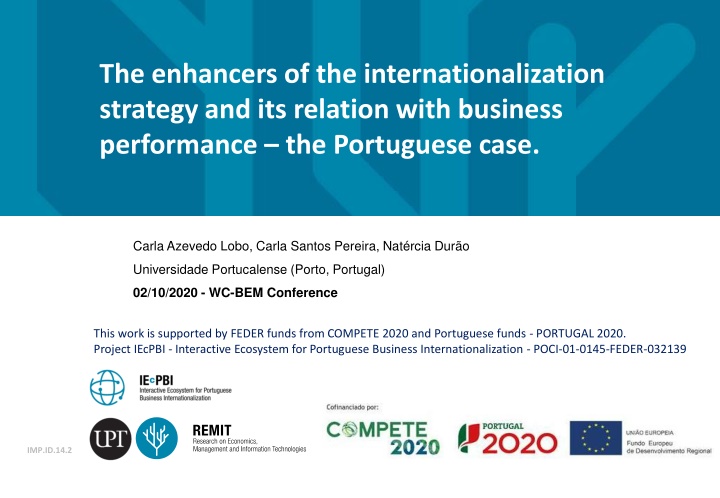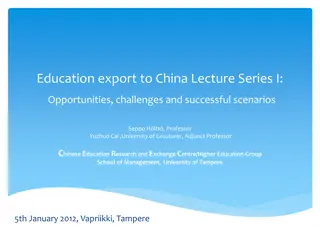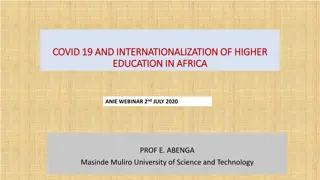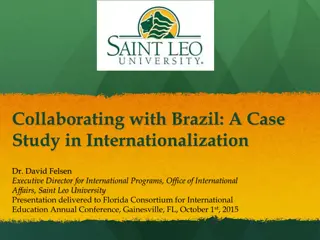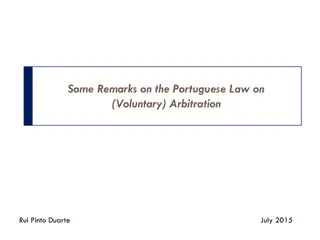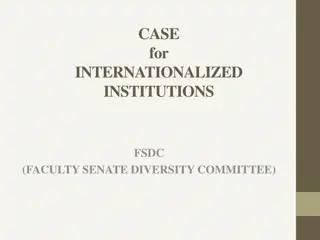Enhancers of Internationalization Strategy for Business Performance: Portuguese Case
This study examines factors enhancing internationalization strategy and their impact on business performance, focusing on the Portuguese context. It delves into theoretical models such as the Internationalization Process Theory and International New Ventures theory.
Download Presentation

Please find below an Image/Link to download the presentation.
The content on the website is provided AS IS for your information and personal use only. It may not be sold, licensed, or shared on other websites without obtaining consent from the author.If you encounter any issues during the download, it is possible that the publisher has removed the file from their server.
You are allowed to download the files provided on this website for personal or commercial use, subject to the condition that they are used lawfully. All files are the property of their respective owners.
The content on the website is provided AS IS for your information and personal use only. It may not be sold, licensed, or shared on other websites without obtaining consent from the author.
E N D
Presentation Transcript
The enhancers of the internationalization strategy and its relation with business performance the Portuguese case. Carla Azevedo Lobo, Carla Santos Pereira, Nat rcia Dur o Universidade Portucalense (Porto, Portugal) 02/10/2020 - WC-BEM Conference This work is supported by FEDER funds from COMPETE 2020 and Portuguese funds - PORTUGAL 2020. Project IEcPBI - Interactive Ecosystem for Portuguese Business Internationalization - POCI-01-0145-FEDER-032139 IMP.ID.14.2
OBJECTIVES - In accordance with International New Ventures Theory, the Strategic Choice view and Network theory, we expect to find evidence of the correlation between the factors that act, on the entrepreneur perspective, as enhancers of the internationalization strategy and the percentage of business that resulted from internationalization (termed Turnover ). - We also intend to ascertain if there is any evidence of the importance of the enhancing factors related to skills, knowledge and networks in international business performance. IMP.ID.14.2 2
BACKGROUND AND MOTIVATION - One theoretical model that has dominated literature on new firm s internationalization strategy is the Internationalization Process Theory, initially developed in the works of Johanson and Wiedersheim-Paul (1975) The other one is the International New Ventures model (INV), first proposed by Oviatt and McDougall (1994) According to the internationalization process theory, internationalization progresses in stages, as firms start to develop locally before expanding to foreign markets (Johanson and Vahlne 1990). The international new ventures model (INV), on the other hand, states that some young SME s rapidly internationalize exporting to distant markets practically since birth. Thus, instead of following a gradual internationalization process, these firms enter international markets almost immediately, without waiting until they have acquired experience in the domestic market with success. - - - This new perspective on international new ventures and its growing popularity, has created bigger interest on this issue and on its influence on international business performance. IMP.ID.14.2 3
LITERATURE REVIEW - A growing flow of research on international new ventures has sought to understand the processes and outcomes of the decision to enter in foreign markets at an early stage. A common thread concerns the role of learning and knowledge (McDougall and Oviatt 2000; ) Organizational knowledge or experience, or their absence, was a central explanation for internationalization in original stage-based models. To this perspective, De Clercq et al. (2005: 409) call behavioral view of internationalization. Also Oviatt and McDougall (1994) recognized that individual factors, such as international experience, could also influence the pace, the beginning and the performance of internationalization. - - - IMP.ID.14.2 5
LITERATURE REVIEW - This perspective on international new ventures argues that international ventures do not need organizational experiences, routines or capabilities to succeed in external markets. On the contrary, the international experiences of founders and other key managers can replace such shortcomings (Oviatt and McDougall 1994; Javalgi and Todd 2011). - - De Clerq et al. (2005) call this approach strategic choice view. - Empirical evidences also provides important insights on the internationalization of new business, showing that younger firms are able to compensate their limited experiential learning at firm level, through learning based on previous experiences of the management team (congenital learning), and through inter-organizational relationships (vicarious learning). The most common type of vicarious learning discussed in conceptual and empirical works involves learning with a network. IMP.ID.14.2 5
LITERATURE REVIEW - Being a member of a network provides a variety of technical, financial, and perhaps even more important, knowledge about the external market enabling a reduction in the risks of psychological distance. Younger firms can also compensate their limited international experience through business digitalization (Beneki, Papastathopoulos and Tsagris, 2011). To develop competitive advantages that implies the acquirer of new skills, resources and capabilities (Nakos, Dimitratos and Elbanna, 2018), firms can do that through alternative forms of management and with the help of new technologies There s also the need to validate the efforts on internationalisation considerations, that is, to minimise perceived re-wards outweighing perceived risks. In other words, adequate validation efforts help in risk/reward considerations. Therefore, the autonomy in the decisions it s crucial to the success. - - IMP.ID.14.2 5
METHODOLOGY AND DATA Variables Based on the literature review, we decided to focus our attention on the following enhancing factors of entrepreneurial internationalization: - International Experience of employees; - Entrepreneurial Characteristics (the propensity to take risks) and Specific Skills of the employees; - Relational Networks, Formal and Informal; - Firm Age and Size; - Incentives/support for Internationalization and access to funds facilities; - Physical and psychological distance; - Business digitalization; - Autonomy in decision making; IMP.ID.14.2 6
METHODOLOGY AND DATA Variables In addition, we consider as dependent variable, the Percentage of business that resulted from internationalization (Turnover), in order to access whether or not those factors that entrepreneurs consider as the most important for the internationalization of their firm, significantly influence the results of their internationalization strategy. IMP.ID.14.2 6
METHODOLOGY AND DATA Methodology Data collected from the 238 valid responses (Portuguese international firms) were treated by IBM SPSS Statistics 26.0 software. The statistical analyses used for the data analysis were Univariate Descriptive Analysis (frequency analysis, descriptive statistics and graphical representations), Multivariate Descriptive Analysis (EFA- Exploratory Factor Analysis) and Inferential Analysis (Spearman s ordinal correlation and Chi-Square Test). IMP.ID.14.2 6
Results Figure 2- Boxplot of the enhancing factors for internationalization As it is easily perceptible, the five most important factors (in descending order of importance) are Specific skills of the employees (Skills) , Autonomy in decision making (Autonomy) , Strong entrepreneurial propensity and propensity to assume risks (Risks) , Formal contact networks (Networks) and International experience of the employees (International Experience) . IMP.ID.14.2 7
Results The Spearman correlation coefficient results revealed a positive correlation between "Turnover" and these four factors: "Skills", "International Experience", "Risks" and "Autonomy". IMP.ID.14.2 7
Table 1- Crosstabs between variables Turnover and Autonomy Results Autonomy Nothing Little Very Extremely important important Important important important Total Turnover [0,25[ Count 10 14 30 33 17 104 % within Turnover 9,6% 13,5% 28,8% 31,7% 16,3% 100,0% % within Autonomy 52,6% 70,0% 46,2% 38,4% 35,4% 43,7% [25-75[ Count 7 5 25 24 16 77 % within Turnover 9,1% 6,5% 32,5% 31,2% 20,8% 100,0% % within Autonomy 36,8% 25,0% 38,5% 27,9% 33,3% 32,4% 75 Count 2 1 10 29 15 57 % within Turnover 3,5% 1,8% 17,5% 50,9% 26,3% 100,0% % within Autonomy 10,5% 5,0% 15,4% 33,7% 31,3% 23,9% Total Count 19 20 65 86 48 238 % within Turnover 8,0% 8,4% 27,3% 36,1% 20,2% 100,0% % within Autonomy 100,0% 100,0% 100,0% 100,0% 100,0% 100,0% The contingency table (Table 1) allows us to conclude that 77.2% of the firms with a business percentage at least 75%, consider factor "Autonomy" as very important or extremely important. IMP.ID.14.2 7
Results Exploratory Factorial Analysis (EFA) Component 1 2 Specific skills ,697 ,180 International experience ,689 ,304 Strong entrepreneurial propensity and propensity to assume risks ,733 ,171 Formal contact network ,703 -,341 Autonomy in decision making ,386 ,574 Turnover_rec -,008 ,823 IMP.ID.14.2 7
Results In resume, - the first component highlights the preponderant factors for internationalization, but they are not directly reflected on Turnover. - on the other hand, we find that the second component, allow us to conclude that the greater the degree of importance assigned to autonomy in decision making (Autonomy), the higher the percentage of business resulting from internationalization (Turnover). IMP.ID.14.2 7
CONCLUSION We were able to conclude that: - The five most important factors that entrepreneurs consider as enhancers of internationalization are Specific skills of the employees (Skills) , Autonomy in decision making (Autonomy) , Strong entrepreneurial propensity and propensity to assume risks (Risks) , Formal contact networks (Networks) and International experience of the employees (International Experience) . - the greater the degree of importance assigned to each of these factors, the greater the percentage of Turnover. - there is an association between "Turnover" and "Autonomy" and that 77.2% of the firms with a business percentage at least 75%, consider factor "Autonomy" as very important or extremely important. A very interesting result allow us to conclude that 4 of the 5 most important factors are connected to the firm's employees (skills, international experience, propensity to assume risks and autonomy). IMP.ID.14.2 15
